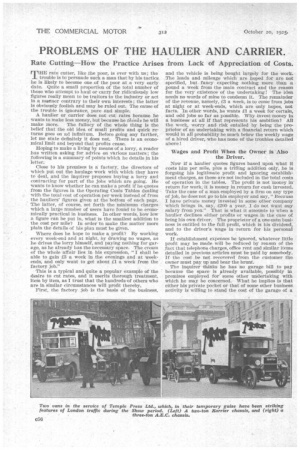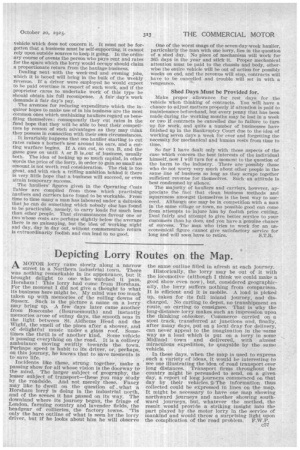PROBLEMS OF THE HAULIER AND CARRIER.
Page 48

Page 49

If you've noticed an error in this article please click here to report it so we can fix it.
Rate Cutting—How the Practice Arises from Lack of Appreciation of Costs.
THE rate cutter, like the poor, is ever with us ; the trouble is to persuade such a man that by his tactics he is likely to become one of the poor at a very early date. Quite a small proportion of the total number of those who attempt to haul or carry for ridiculously low figures really mean to be traitors to the industry or act in a matiner contrary to their own interests ; the latter is obviously foolish and may be ruled out. The cause of the trouble is ignorance, pure and simple.
A haulier or carrier does not cut rates because he wants to make less money, but because he thinks he will make more. The fallacy of the whole thing is the belief that the old idea of small profits and quick returns goes on ad infinitum. Before going any farther, let me state definitely it does not. There is an economical limit and beyond that profits cease.
Hoping to make a living by means of a lorry, a reader has written asking for advice on various matters ; the following is a summary a points which he details in his letter.
Close to his premises is a factory, the directors of which put out the haulage work with which they have to deal, and the inquirer proposes buying a lorry and contracting for part of the jobs which are going. He wants to know whether he can make a profit if he quotes from the figures in the Operating Costs Tables dealing with the total cost of operation per week instead of from the hauliers' figures given at the bottom of each page. The latter, of course, set forth the minimum charges which a large number of users have found to be economically practical in bilsiness. In other words, how low a figure can be put in, what is the smallest addition to the cost per mile? In order to make the matter more plain the details of his plan must be given.
Where does he hope to make a profit? By working every week-end and at night, by drawing no wages, as he drives the lorry himself, and paying nothing for garage, as he already has the necessary space. The cream of the whole affair lies in his expression, "I shall be able to gain 13 a week in the evenings and at week ends, and only want to get about a week from the factory job."
This is a typical and quite a popular example of the desire to cut rates, and it merits thorough treatment, item by item, as I trust that the hundreds of others who are in similar circumstances will profit thereby., First, the factory job is the basis of the business, and the vehicle is being bought largely for the work. The loads and mileage -which are hoped for are not specified, but fancy expecting nothing more than a pound a week from the main contract and the reason for the very existence of the undertaking The idea needs no words of mine to condemn it. The remainder of the revenue, namely, £3 a week, is to come from jobs at night or at week-ends, whieh are only hopes, not facts. In other words, he wants Li a week for certain, and odd jobs so far as possible. Why invest moneyin a business at all if that represents his ambition? All the work, worry andrisk entailed by being the proprietor of an undertaking with a financial return which would in all probability be much below the weekly wage of a hired driver, who has none of the troubles detailed above
Wages and Profit When the Owner is Also the Driver.
Now if a haulier quotes figures based upon what it costs him per mile, plus a trifling addition only, he is forgoing his legitimate profit and ignoring establishment charges, as these are not included in the total costs of operation in tile tables. The profit is not money in return for work, it is money in return for cash invested. Take the case of a man employed by a firm on any type of job, he doesnot go to his employer and say, "Because I have private money invested in some other company which brings in, say, £200 a year, .1 do not *ant any salary from you," That is what it amounts to when a haulier declines either profits or wages in the case of being his own driver. The proprietor of a one-nian business is entitled to the full profit, which is his dividend, and to the driver's *rage in return for his personal work.
If establishment expenses be ignored, whatever little profit may be made will be reduced by reason of the /act that telephone charges, office rent and similar items detailed in previous articles must be paid by somebody. If the cost be not recovered from the customer the owner must pay up and bear the brunt.
The inquirer thinks he has no garage bill to pay because the space is already available, possibly in premises employed for some other undertaking with which he may be concerned. What lie implies is that either his private pocket or that of some other business activity is willing to stand the cost of the garage of a 'vehicle which does not concern it. It must not be forgotten that a business must be self-supporting, it cannot rely upon outside sources to keep it going. In the ordinary course of events the person who pays rent and rates for the space which the lorry would occupy should claim a proportionate return from the haulage business.
Dealing next with the week-end and evening jobs, which it is hoped will bring in the bulk of the weekly revenue. If a driver were employed he would expect to be paid overtime in respect of such work, and if the proprietor cares to undertake work of this type he should obtain his full recompense. A fair day's work demands a fair day's pay.
The avenues for reducing expenditure which the inquirer hopes to make use of in his business are the most common ones which unthinking hauliers regard as benefiting themselves; consequently they cut rates in the fond hope that they will be able to beat their competitors by reason of such advantages as they may think they possess in connection with their own circumstances.
It invariably happens that one haulier starting to cut rates raises a hornet's nest around his ears, and a cutting warfare begins. If A can cut, so can B, and the game goes on until A or B is:out of business, usually both. The idea of locking up so much capital, in other words the price of the lorry, in order to gain so small an amount is not worth real consideration. The risk is too great, and with such a trifling ambition behind it there is very little hope that a business will succeed, or even attain temporary success.
The hauliers' figures given in the Operating Costs rabies are compiled from those which practising hauliers and carriers have found to be workable. From time to time many a man has laboured under a delusion that lie can do something which nobody else has found to be practicable, namely, to carry loads for much less than other people. That circumstances favour one or two whose costs are perhaps slightly below the average there is no gainsaying, but the idea of working night and day, day in day out, without commensurate return is extraordinarily foolish and can lead to no good. One of the worst shags of the seven-day-week haulier, particularly the man with one lorry, lies in the question of a shed day. No piece of mechanism will work for 365 days in the year and stick it. Proper mechanical attention must be paid to the chassis and body, otherwise the entire vehicle will be out of action for possibly weeks on end, and the revenue will stop, contracts will have to be cancelled and trouble will set in with a vengea rice.
Shed Days Must be Provided for.
Make proper allowance for rest days for the vehicle When thinking of contracts. You will have a chance to adjust matters properly if attention is paid to maintenance beforehand, but every penny that has been made during the working months may be lost in a week or two if contracts be cancelled due to failure to turn up for work, and quite a number of businesses have finished up in the Bankruptcy Court due to the idea of working seven days a week for ever and forgetting the necessity for mechanical and human rests from time to time.
So far I have dealt only with those aspects of the case which concern the best interests of the individual himself, now I will turn for a moment to the question of the harm to the industry. There are possibly those who do not worry very much about other people in the same line of business so long as they scrape together sufficient revenue for themselves. Such an attitude is best condemned by silence.
The majority of hauliers and carriers, however, appreciate the fact that clean business methods and squareness amongst themselves is the best way to succeed. Although one may be in competition with a man in-the same village or town, no possible good can come from attempts to injure him by foolish price cutting. Deal fairly and attempt to give better service to your customers than he does, and you have a -genuine chance of success. The man who tries to work. for an uneconomical figure cannot give satisfactory service for
long and will soon have to retire. S.T.R.




















































